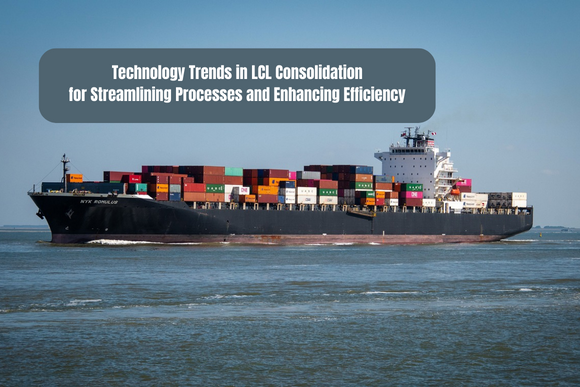Introduction:
In the dynamic realm of logistics, Less than Container Load (LCL) consolidation has become a pivotal strategy for optimizing shipping costs and improving overall efficiency. The integration of cutting-edge technologies is transforming the landscape of LCL consolidation, offering unprecedented opportunities for streamlining processes. In this in-depth blog,we will delve into the latest technology trends shaping LCL consolidation and how they are revolutionizing the industry.
- Blockchain in LCL Consolidation : The utilization of blockchain technology is revolutionizing transparency and trust within LCL consolidation. Explore how blockchain ensures secure, tamper-resistant documentation, real-time visibility of shipments, and smart contracts for automated processes. Discuss its impact on reducing fraud, errors, and delays in the supply chain.
- Internet of Things (IoT) and Real-Time Tracking : IoT devices are playing a crucial role in LCL consolidation by providing real-time tracking and monitoring of shipments. Discuss how IoT sensors on containers enable constant visibility into cargo conditions, including temperature, humidity, and location. Explore the benefits of proactive issue identification and resolution through IoT data.
- Artificial Intelligence (AI) for Predictive Analytics : AI is transforming LCL consolidation through predictive analytics. Delve into how machine learning algorithms analyze historical data to predict shipping patterns, optimize routes, and anticipate potential disruptions. Discuss the impact on inventory management, reducing lead times, and enhancing overall supply chain efficiency.
- Automation and Robotics in Warehousing : Automation and robotics are streamlining warehouse operations in LCL consolidation. Explore how autonomous vehicles, robotic arms, and automated sorting systems are expediting the loading and unloading of containers. Discuss the implications of increased accuracy, reduced labor costs, and accelerated order fulfillment.
- Cloud-Based Collaboration Platforms : Cloud-based collaboration platforms are enhancing communication and coordination among stakeholders in LCL consolidation. Discuss how cloud technology facilitates real-time data sharing, document management, and collaboration among shippers, freight forwarders, and carriers. Explore the benefits of improved visibility and streamlined workflows.
- Augmented Reality (AR) for Warehouse Operations : Augmented Reality is making waves in LCL consolidation by enhancing warehouse efficiency. Explore how AR glasses and devices guide workers in picking and packing processes, reducing errors and increasing productivity. Discuss its impact on training programs and minimizing the learning curve for new warehouse staff.
- Data Analytics for Supply Chain Optimization : The power of data analytics is optimizing supply chain operations in LCL consolidation. Explore how analytics tools process vast amounts of data to identify inefficiencies, improve route planning, and enhance overall logistics performance. Discuss its role in data-driven decision-making for continuous improvement.
- Customs Compliance and Digitization : The digitization of customs processes is streamlining compliance in LCL consolidation. Discuss how electronic documentation, automated customs clearance systems, and integration with customs authorities contribute to smoother cross-border movements. Explore the benefits of reducing delays and enhancing overall trade compliance.
- Dynamic Route Optimization through Machine Learning : Explore how machine learning is applied to optimize shipping routes dynamically in LCL consolidation. Discuss the role of algorithms that continuously analyze real-time data, such as traffic conditions, weather forecasts, and carrier capacities, to recommend the most efficient routes. Highlight the impact on reducing transit times and enhancing overall logistics efficiency.
- Mobile Applications for Shipment Visibility : Mobile applications are playing a pivotal role in providing stakeholders with on-the-go visibility into LCL shipments. Discuss how these apps enable real-time tracking, notifications, and access to critical shipment information. Explore the benefits of enhanced accessibility, empowering users to make informed decisions irrespective of their location.
- Collaborative Robotics in Container Loading : The integration of collaborative robotics, or cobots, is transforming container loading processes in LCL consolidation. Explore how cobots work alongside human operators to streamline the loading of goods into containers. Discuss the benefits of increased efficiency, reduced physical strain on workers, and improved safety standards.
- Predictive Maintenance for Fleet Optimization : Predictive maintenance powered by IoT and AI is optimizing the performance of transportation fleets in LCL consolidation. Discuss how sensors on trucks and containers can predict equipment failures before they occur. Explore the impact on reducing downtime, minimizing maintenance costs, and ensuring the reliability of the transportation infrastructure.
- Augmented Reality for Last-Mile Delivery : Augmented Reality is not limited to warehouse operations; it is also making inroads into last-mile delivery in LCL consolidation. Discuss how AR can assist delivery drivers in navigating routes, locating delivery points, and verifying shipments. Explore the potential for reducing delivery errors and enhancing customer satisfaction.
- Eco-Friendly Practices with Sustainable Technologies : Explore how sustainable technologies are being incorporated into LCL consolidation to address environmental concerns. Discuss the use of electric vehicles, eco-friendly packaging materials, and energy-efficient warehouse technologies. Highlight the importance of adopting environmentally conscious practices for long-term sustainability in logistics.
- Security Enhancements with Digital Twin Technology : Digital twin technology is enhancing security measures in LCL consolidation. Discuss how digital representations of physical containers, warehouses, and vehicles enable real-time monitoring and threat detection. Explore the benefits of increased security, reduced risks of theft or tampering, and improved overall supply chain resilience.
Conclusion:
The relentless evolution of technology is reshaping the landscape of LCL consolidation, offering unprecedented opportunities for efficiency, visibility, and sustainability. As stakeholders in the logistics industry continue to embrace these technological trends, the future of LCL consolidation holds the promise of streamlined processes, reduced costs, and a more resilient and responsive supply chain. Those who leverage these innovations strategically will be well-positioned to thrive in an era where the intersection of technology and logistics is driving transformative change.



